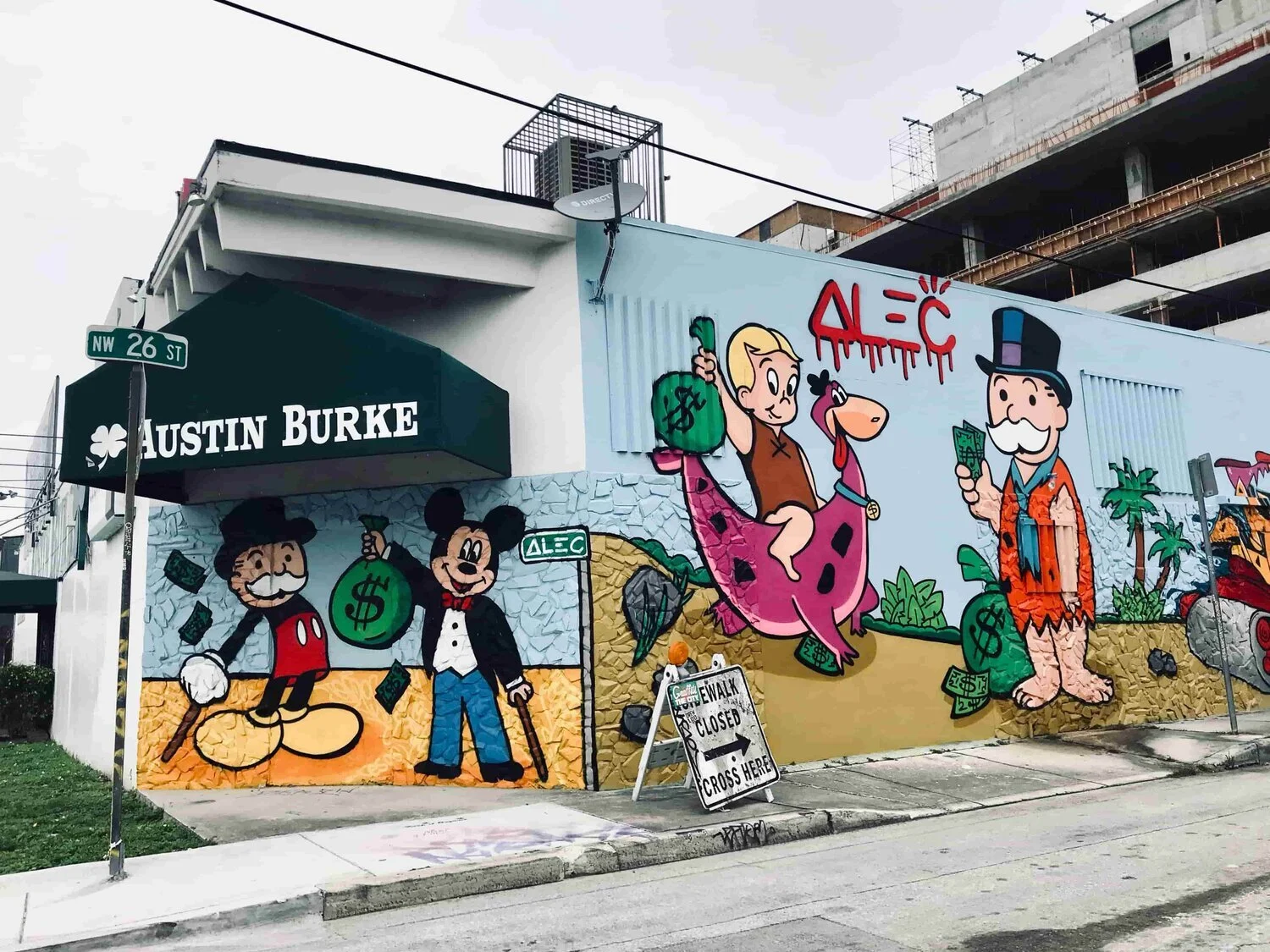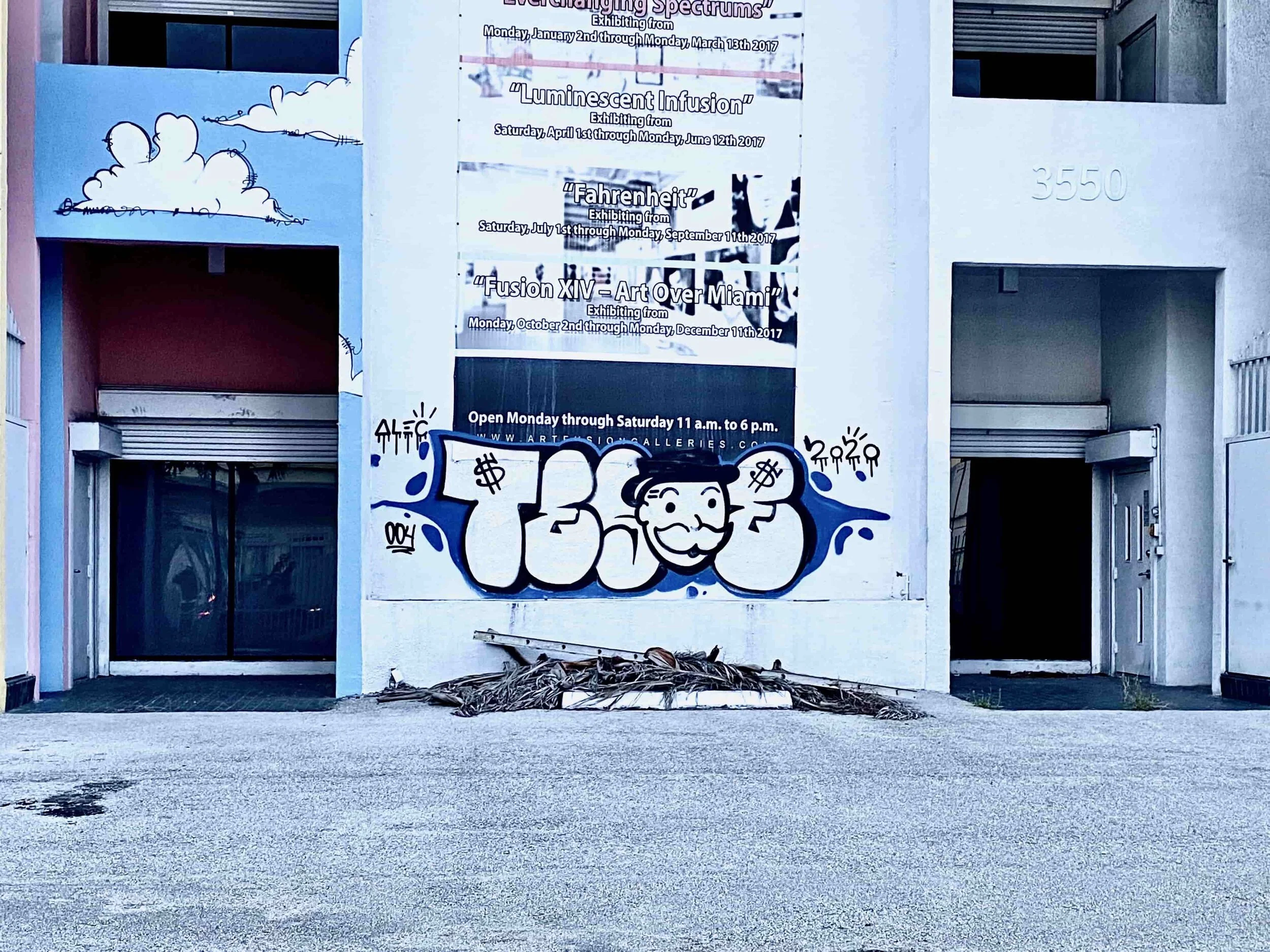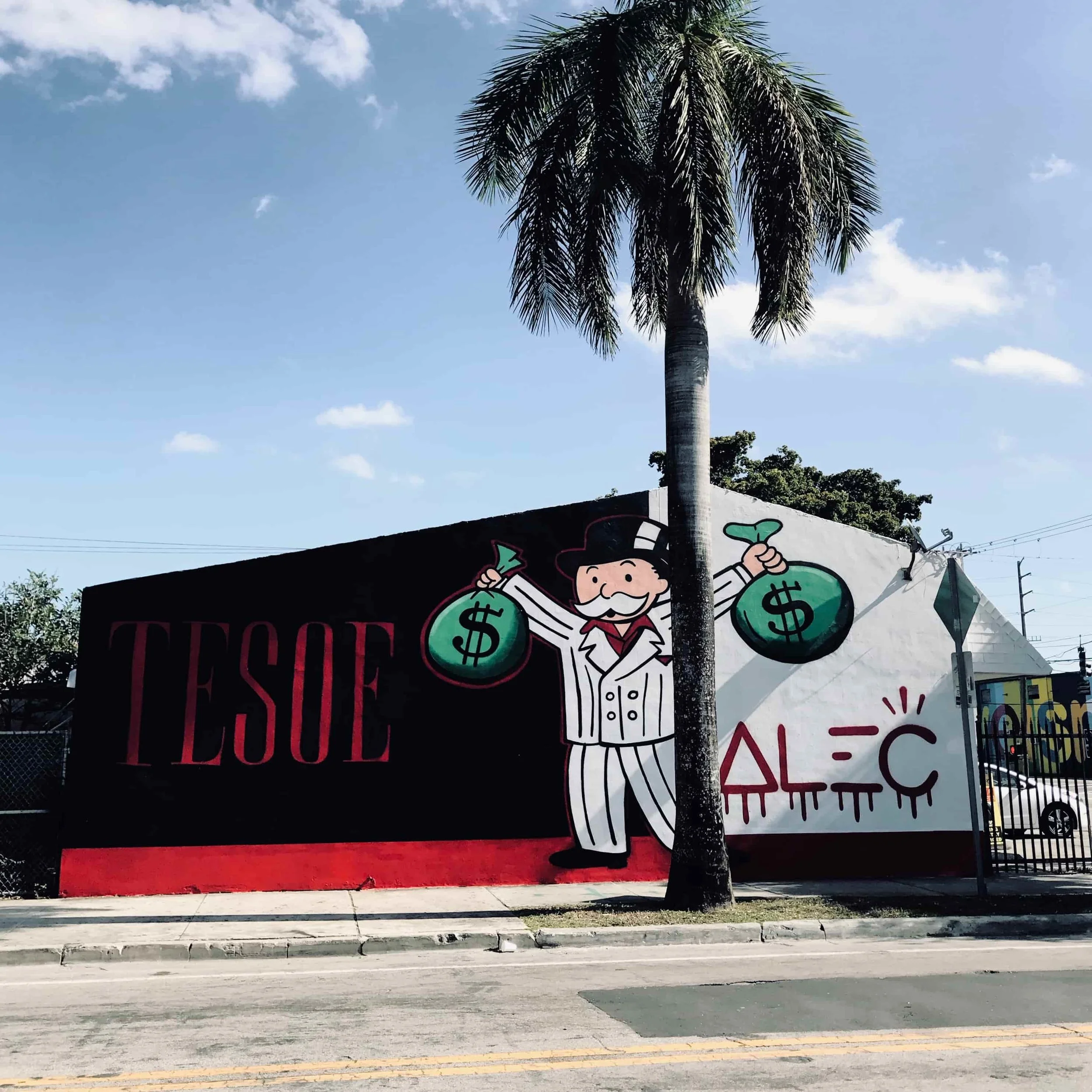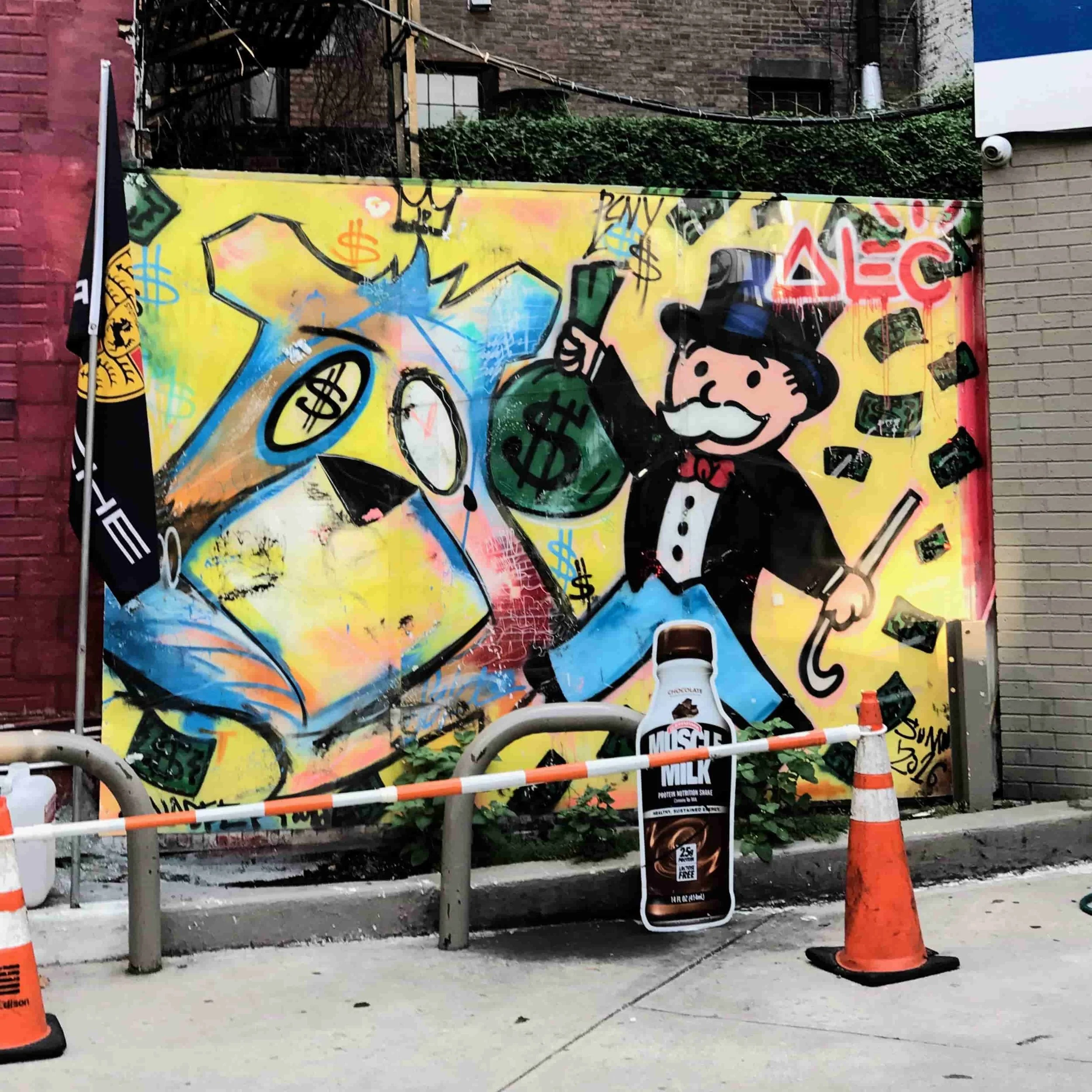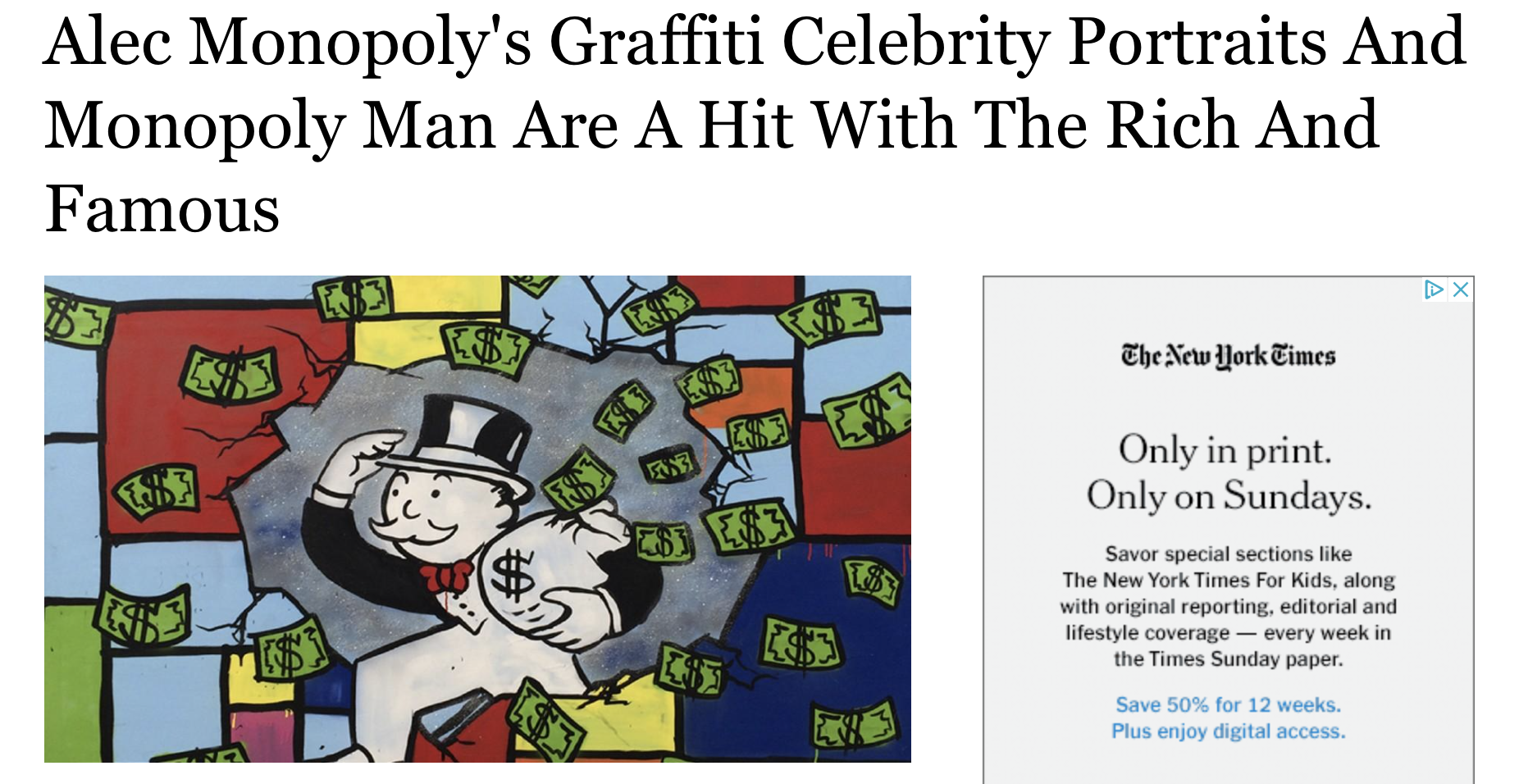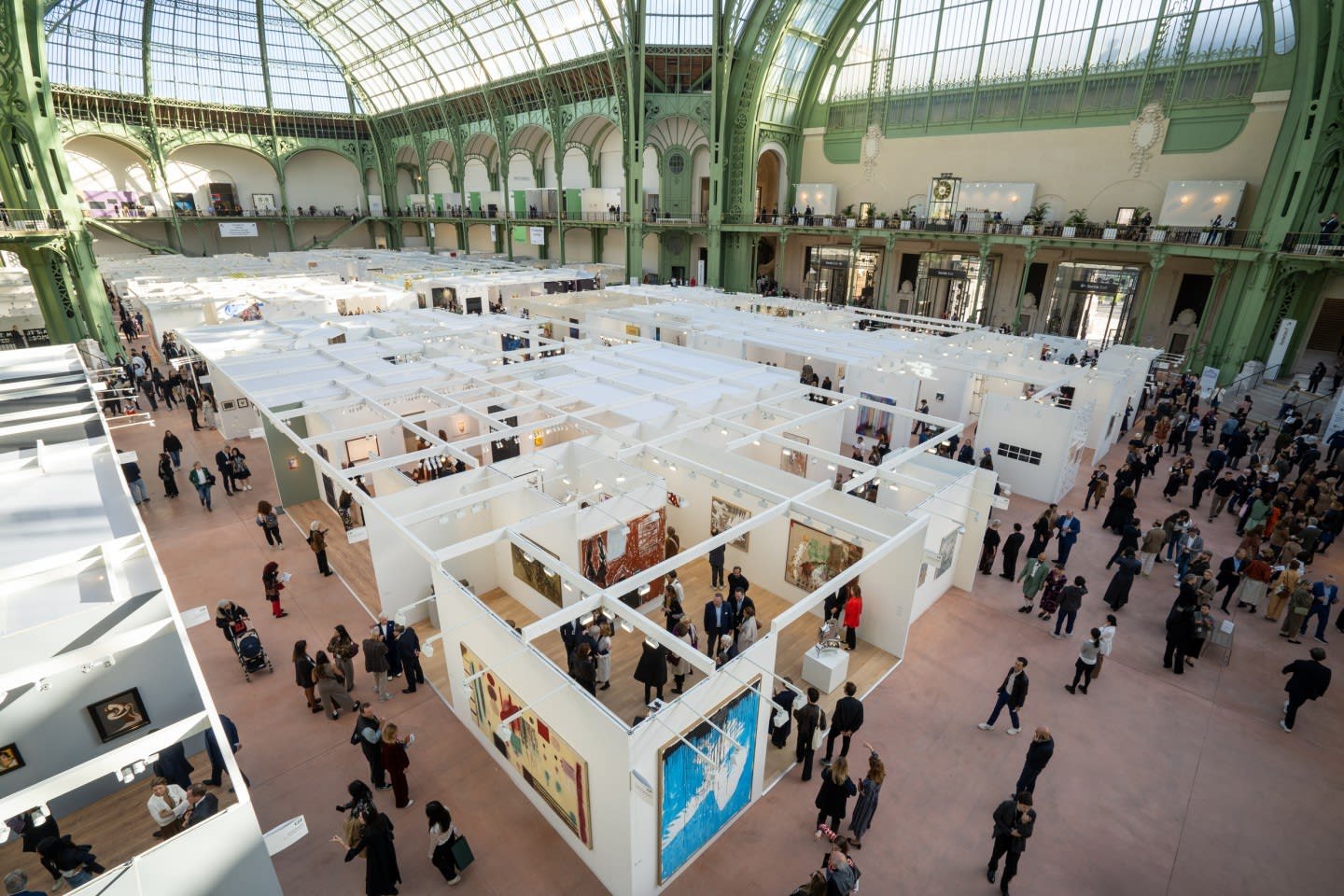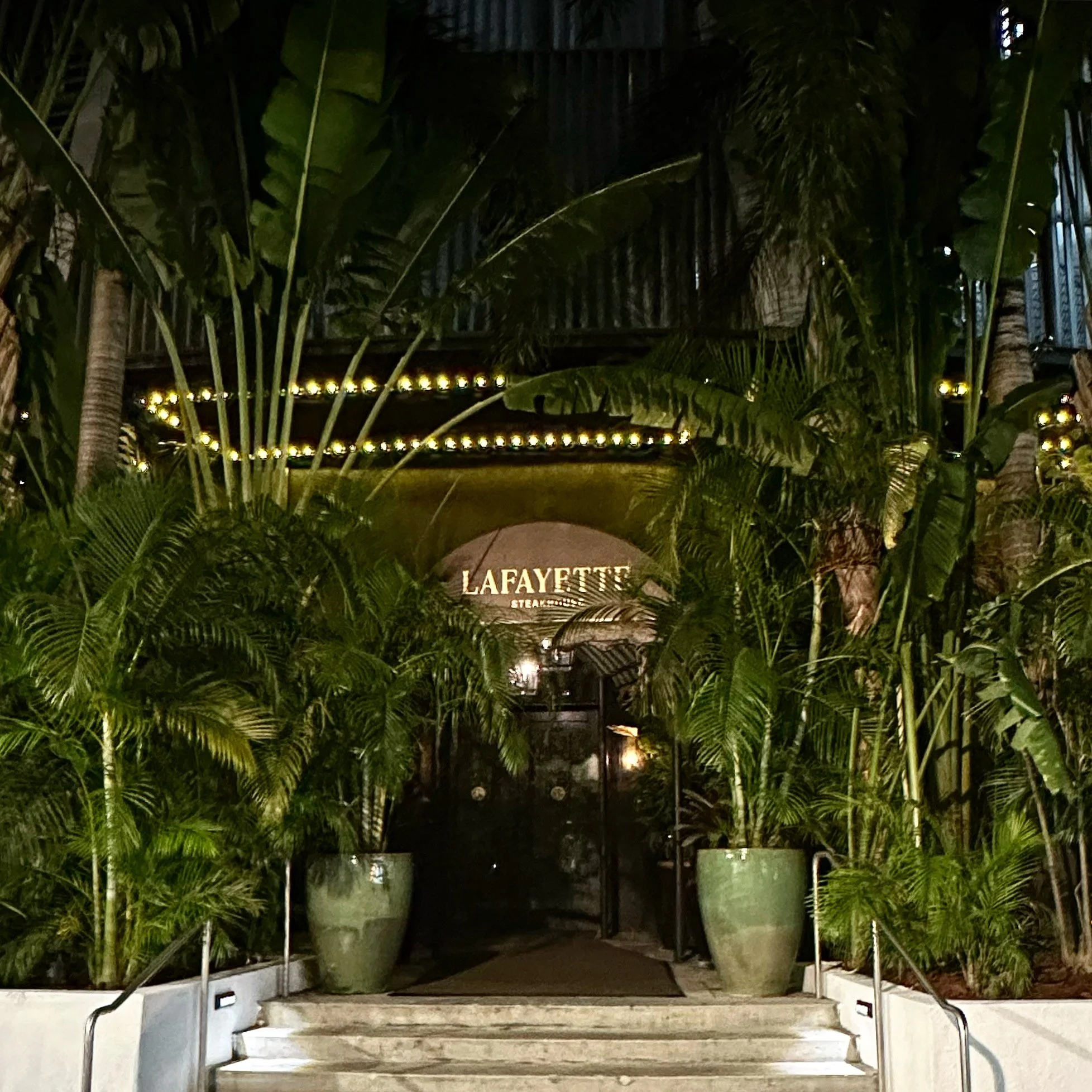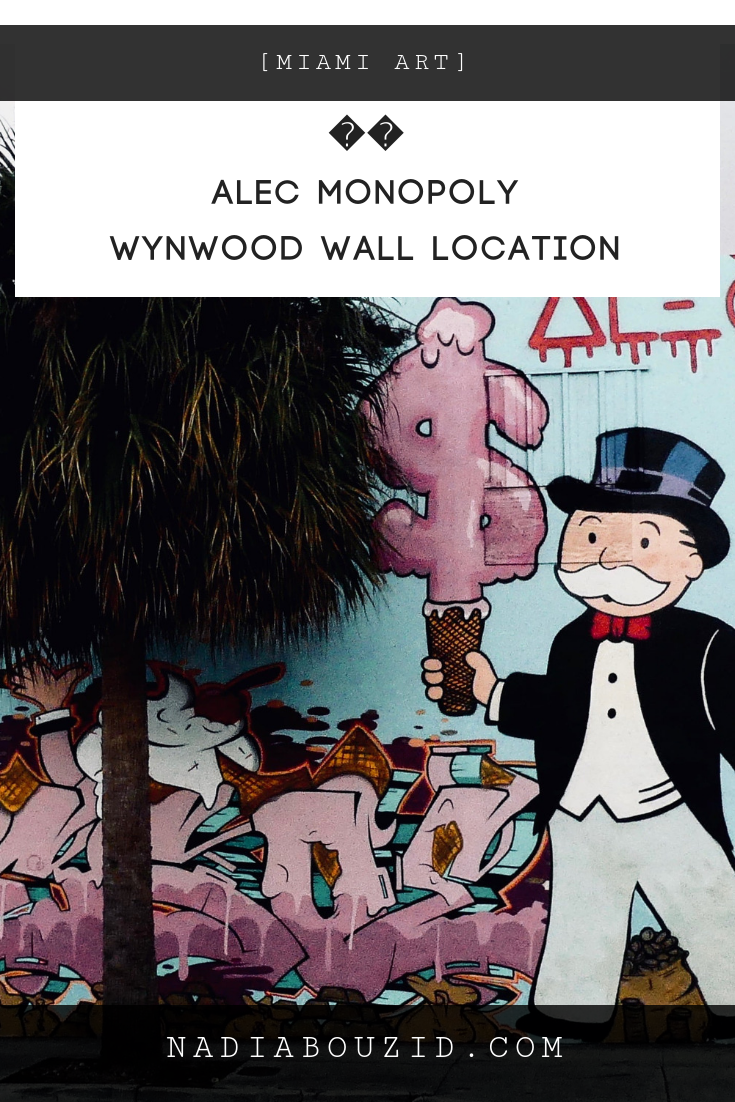Alec Monopoly's Wealthy Icons: Richie Rich and Rich Uncle Pennybags in Wynwood
Alec Monopoly, the enigmatic street artist, has masterfully etched his name into the world of contemporary art. His playful and thought-provoking creations often star iconic characters from pop culture, and two of his recurring favorites are Richie Rich and Rich Uncle Pennybags.
THE WAREHOUSE, FROM NW 2ND AVENUE| Featuring: Rich Uncle Pennybags holding and ice cream cone + Richie Rich holding a green money bag
Artist: Alec Aldon a.k.a. Alec Monopoly |In collaboration with: Teso3
Date Created: Around November 2017, just before the crowds invaded Miami for Art Basel week.
📍Location: Wynwood, Miami | 📍Location: 2041 NW 2nd Ave, Miami, FL 33127 | photo by Nadia Bouzid
Lot Size: 10,500 sqft
The Iconic Pair: Richie Rich and Rich Uncle Pennybags:
Richie Rich, the "poor little rich boy" of comic book fame, and Rich Uncle Pennybags, the face of the Monopoly board game, symbolize two facets of wealth in popular culture. Richie embodies inherited wealth and youthful innocence, while Rich Uncle Pennybags represents the world of finance and capitalism. Alec Monopoly's choice to spotlight these characters in his art underscores his remarkable ability to bridge the gap between childhood nostalgia and adult realities.
Artist: Alec Monopoly | Location: Wynwood, Miami photo by Nadia Bouzid | see more street art
Richie Rich by Alec Monopoly📍Location: Wynwood, Miami | photo by Nadia Bouzid | see more street art
Richie Rich: A Tale of Opulence and Youthful Extravagance:
Richie Rich, conceived by Alfred Harvey and Warren Kremer in 1953, is celebrated for his extravagant lifestyle as the sole heir to billionaire parents. Despite his vast fortune, Richie's generosity and willingness to aid those in need define his character. Alec Monopoly's reinterpretation of Richie Rich injects a breath of fresh air. Richie often finds himself in playful and unexpected scenarios, prompting viewers to ponder the complexities of inherited wealth and privilege.
The Quintessential Symbol of Affluence: Richie Rich, has long been a symbol of extreme wealth and opulence in popular culture. As the only child of multi-billionaire parents, Richard "Richie" Rich Jr. lives a life of extravagance, surrounded by an array of gadgets and gizmos that cater to his every whim. Yet, despite his immense wealth, Richie Rich is characterized by his kind-hearted nature, often using his resources to help others and right societal wrongs. Alec Monopoly's artistic appropriation of Richie Rich is a fascinating commentary on the duality of wealth. By portraying this beloved character in his signature street art style, Monopoly explores the tension between opulence and altruism, materialism and philanthropy. Richie Rich becomes a symbol of both excess and benevolence, challenging viewers to reflect on the implications of extreme wealth in today's society.
Wealth, Consumerism, and Social Commentary: Alec Monopoly's use of Richie Rich is not just about artistic expression; it's a form of social commentary. In an era marked by conspicuous consumption and growing wealth inequality, Monopoly's art prompts us to contemplate the consequences of our obsession with material possessions. Richie Rich becomes a lens through which we can examine the excesses of consumer culture and the need for a more equitable distribution of wealth.
Rich Uncle Pennybags: The Emblem of Capitalism:
Rich Uncle Pennybags, also known as Mr. Monopoly, graces the Monopoly board game with his iconic presence. He embodies the world of finance, investment, and capitalism. Alec Monopoly's portrayal of Rich Uncle Pennybags transcends the boundaries of the board game. Monopoly frequently weaves this character into his street art, delving into themes of wealth accumulation, corporate influence, and economic disparity. Pennybags, donned in his signature top hat and monocle, emerges as a symbol of the financial institutions that hold sway over our lives.
What sets Alec Monopoly's utilization of Richie Rich and Rich Uncle Pennybags apart is his knack for juxtaposing childhood nostalgia with adult realities. He challenges viewers to reevaluate their connections to wealth, materialism, and societal norms. Through his whimsical reinterpretations, Monopoly encourages us to reflect on the consequences of extreme affluence, inherited riches, and the far-reaching impact of capitalism on our existence.
Societal Commentary Through Street Art:
Alec Monopoly's art transcends visual allure; it serves as a vessel for societal commentary. His imaginative interplay between Richie Rich and Rich Uncle Pennybags urges us to contemplate the broader repercussions of wealth and privilege within our society. He prompts viewers to scrutinize the pursuit of material possessions and grapple with the ramifications of economic inequality.
Alec Monopoly's artistic ingenuity, as unveiled through his portrayal of Richie Rich and Rich Uncle Pennybags, invites us on a voyage of contemplation. By employing these iconic characters, he prods us to reconsider our perspectives on wealth, capitalism, and societal conventions. His street art acts as a catalyst for pivotal dialogues concerning inherited riches, corporate dominance, and the pursuit of a more equitable future. As we admire Alec Monopoly's artistry, a harmonious blend of whimsy and profundity, we're reminded that art possesses the remarkable capacity to ignite discourse and ignite change.
What sets Alec Monopoly's utilization of Richie Rich and Rich Uncle Pennybags apart is his knack for juxtaposing childhood nostalgia with adult realities. He challenges viewers to reevaluate their connections to wealth, materialism, and societal norms. Through his whimsical reinterpretations, Monopoly encourages us to reflect on the consequences of extreme affluence, inherited riches, and the far-reaching impact of capitalism on our existence.
Alec Monopoly's art transcends visual allure; it serves as a vessel for societal commentary. His imaginative interplay between Richie Rich and Rich Uncle Pennybags urges us to contemplate the broader repercussions of wealth and privilege within our society. He prompts viewers to scrutinize the pursuit of material possessions and grapple with the ramifications of economic inequality.
Alec Monopoly's artistic ingenuity, as unveiled through his portrayal of Richie Rich and Rich Uncle Pennybags, invites us on a voyage of contemplation. By employing these iconic characters, he prods us to reconsider our perspectives on wealth, capitalism, and societal conventions. His street art acts as a catalyst for pivotal dialogues concerning inherited riches, corporate dominance, and the pursuit of a more equitable future. As we admire Alec Monopoly's artistry, a harmonious blend of whimsy and profundity, we're reminded that art possesses the remarkable capacity to ignite discourse and ignite change.
PROPERTY FACTS
Property Type: Retail
Property Subtype: Freestanding
Building Size: 3,300 SF
Building Class: C
Year Built: 1958
Tenancy: Single
Building Height: 2 Stories
Building FAR: 0.32
Land Acres: 0.24 AC
Zoning: T5-O
Parking: 7 Spaces
Frontage: 15 FT on Northwest 2nd Avenue
Opportunity Zone: NO
📍Location: 2041 NW 2nd Ave, Miami, FL 33127
Analyzing an Alec Monopoly Mural: Richie Rich and Rich Uncle Pennybags in a Gentrified Neighborhood | WYNWOOD
Alec Monopoly, the renowned street artist known for his thought-provoking and visually captivating works, often incorporates iconic figures like Richie Rich and Rich Uncle Pennybags to convey intricate messages. When examining a mural featuring these characters within a gentrified neighborhood, we unveil several layers of significance and social commentary:
1. Symbolism of Wealth: Richie Rich and Rich Uncle Pennybags epitomize affluence and financial success. Richie represents inherited wealth, while Rich Uncle Pennybags embodies the world of capitalism and finance. Their inclusion in the mural immediately highlights the theme of wealth.
2. Gentrification Commentary: The deliberate placement of this mural in a gentrified neighborhood serves as a powerful statement by the artist. Gentrification typically involves the influx of more prosperous residents into an area previously inhabited by lower-income communities. Alec Monopoly's mural can be interpreted as commentary on the neighborhood's transformation due to gentrification, prompting questions about its impact on original residents and local culture.
3. Wealth Disparity: The mural featuring these affluent characters in a gentrified neighborhood emphasizes the growing wealth disparity prevalent in urban centers. While the neighborhood undergoes changes, the artwork reminds viewers of the stark contrasts between the prosperous and the less fortunate residents.
4. Irony and Subversion: Alec Monopoly is renowned for his subversive take on wealth and capitalism. By situating Richie Rich and Rich Uncle Pennybags in this context, the artist employs irony to challenge conventional notions of success and affluence. It may serve as a critique of the materialistic aspects associated with gentrification.
5. Social Discourse: This mural acts as a catalyst for dialogue. It encourages viewers to contemplate the consequences of gentrification, the role of wealth in urban development, and the displacement experienced by original residents. It initiates discussions about who benefits from neighborhood transformations and who is left marginalized.
6. Art as Activism: Street art, particularly within gentrified areas, frequently functions as a form of activism. It amplifies the voices of marginalized communities and spotlights social issues. Alec Monopoly's mural can be perceived as an artistic expression of advocacy on behalf of the neighborhood's original residents.
Alec Monopoly's mural featuring Richie Rich and Rich Uncle Pennybags within a gentrified neighborhood constitutes a multi-layered commentary encompassing wealth, gentrification, and societal inequalities. Through the inclusion of iconic characters, it stimulates conversations regarding Wynwood’s evolving landscape and the broader implications of urban development. Ultimately, it underscores the influential role of art in prompting critical discussions about the evolving world around us.
Alec Monopoly's Artistic Genius:
What sets Alec Monopoly's utilization of Richie Rich and Rich Uncle Pennybags apart is his knack for juxtaposing childhood nostalgia with adult realities. He challenges viewers to reevaluate their connections to wealth, materialism, and societal norms. Through his whimsical reinterpretations, Monopoly encourages us to reflect on the consequences of extreme affluence, inherited riches, and the far-reaching impact of capitalism on our existence.
Societal Commentary Through Street Art:
Alec Monopoly's art transcends visual allure; it serves as a vessel for societal commentary. His imaginative interplay between Richie Rich and Rich Uncle Pennybags urges us to contemplate the broader repercussions of wealth and privilege within our society. He prompts viewers to scrutinize the pursuit of material possessions and grapple with the ramifications of economic inequality.
Conclusion:
Alec Monopoly's artistic ingenuity, as unveiled through his portrayal of Richie Rich and Rich Uncle Pennybags, invites us on a voyage of contemplation. By employing these iconic characters, he prods us to reconsider our perspectives on wealth, capitalism, and societal conventions. His street art acts as a catalyst for pivotal dialogues concerning inherited riches, corporate dominance, and the pursuit of a more equitable future. As we admire Alec Monopoly's artistry, a harmonious blend of whimsy and profundity, we're reminded that art possesses the remarkable capacity to ignite discourse and ignite change.
Latest Posts
Alec Monopoly Walls in Miami:
Mr. Monopoly and Richie Rich in a Turquoise dream:📍2041NW 2nd Ave, Miami, FL 33127 :[December 2017]
The Money Team in Miami: 📍2100 NW 2nd Avenue [November 2018]
Rich Uncle Penny bags as Tony Montana:📍 NW 2nd av [November 2018]
Rich Uncle Pennybags flying like Mary Poppins intervined by CHROMEFACE: 📍by the train tracks [November 2018]
Scrooge McDuck, Mr. Monopoly and Richie Rich in the clouds:📍2518 NE 2nd Ave, Miami, FL 33137
The Flintstones à la Monopoly: 📍2601 NW 6th Ave, Miami, FL 33127







